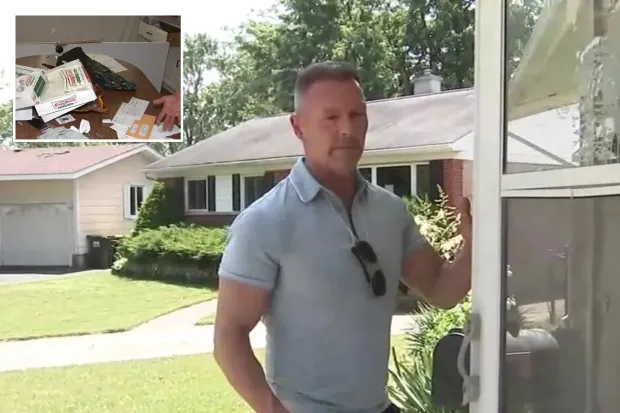Squatters Claimed Ownership of His House, and the Man Had to Pay $25K in Damages

- Info and Tips
Imagine walking into your own home and finding strangers living there—eating your food, letting their dog run loose, and claiming the house is theirs.
That’s exactly what happened to Mark Goodman, a homeowner in a Chicago suburb. What followed wasn’t just confusing—it was a long, expensive fight to take back what was his.
If you think this can’t happen to you, this story might change your mind.
The Shocking Discovery
Mark Goodman had no reason to expect anything unusual the day he showed up to hand over keys to a new tenant.
But when he arrived at his property in Thornton, just outside of Chicago, he found something that stopped him cold—people were already inside, acting like they lived there.
A man and a group of others, along with a pit bull, had moved in without permission.

Credit: The Sun
When Mark asked who they were, they claimed they had bought the house. Moments later, they changed their story and said they were renting it. Confused and alarmed, he called the police, expecting a quick resolution.
But that didn’t happen. Instead, he was told it was a “civil matter,” meaning the police couldn’t remove the squatters without a court order.
What started as a normal day quickly turned into a nightmare. Mark, the rightful owner, was suddenly locked in a legal battle just to get back into his own home. And this was only the beginning of a long and costly fight.
Why Police Couldn’t Help
When Mark Goodman called the police to report strangers living in his home, he assumed they’d be removed right away. After all, he owned the property and had proof.
But to his surprise, officers told him they couldn’t do anything—not without a court order. Because the squatters claimed they either bought or rented the house, the situation was labeled a “civil dispute,” not a criminal one.
That meant the police couldn’t step in and force them out on the spot. Even though Mark never permitted them to be there, the law required him to go through the court system to remove them. This legal process dragged on for six long months while the squatters stayed in his home, completely unchecked.
During that time, the squatters continued living freely on his property, and Mark was powerless to stop it. The system that should have protected him instead tied his hands. His case shows just how broken the process can be—and how easy it is for someone to take over a home they don’t own, simply by claiming they belong there.
The Cost of Getting His House Back
After six months of legal back and forth, Mark Goodman finally got the squatters out of his home. But the nightmare didn’t end there. Once he stepped back inside, he was hit with the full reality of what they had done.
The house was trashed. Doors were ripped off their hinges, copper plumbing pipes had been cut out and stolen, and the floors were covered in trash, dirty dishes, and dog waste.
The pit bull that had been living there left damage throughout the home. Junk was piled everywhere, and the place looked nothing like the property he had once owned.
Mark described the condition as “an absolute mess,” and estimated the total damage at around $25,000. It wasn’t just cosmetic cleanup—it was major repairs that would take months to complete.
What’s worse, this damage meant he couldn’t rent or sell the house anytime soon. While he had done nothing wrong, he was now left scrambling to find the money to fix his property.
The emotional stress of dealing with the legal system was one thing—but the financial hit added a whole new layer to the struggle. For Mark, reclaiming his home came at a huge price.
A Bigger Problem: How Common Is This?
What happened to Mark Goodman might sound like a one-off case, but it’s not. More and more homeowners are finding themselves in similar situations—where squatters move into vacant homes, claim fake ownership or rental agreements, and stay there while the actual owners are forced to fight a slow legal battle.
In many of these cases, the squatters present forged documents, like fake leases or sale contracts. Even if these papers are suspicious, the law often treats the matter as a civil issue, leaving police with no authority to act right away. That delay gives squatters time to settle in and even cause serious damage, as Mark unfortunately experienced.
This kind of situation tends to happen more often in homes that are left empty—whether they’re on the market, in between renters, or simply owned by someone away for an extended time. And once squatters are in, getting them out legally can take months and cost thousands.
Mark’s story is part of a larger, growing issue. Homeowners across the country are realizing that just locking the door and holding the title isn’t always enough.
A Call for Change: The Pending Squatter Law
After dealing with six months of stress, thousands in damage, and no help from police, Mark Goodman is now speaking out—not just for himself, but for other homeowners who’ve faced the same problem.
He’s urging lawmakers to act faster and give property owners the protection they need. And change may finally be on the way.
Earlier this year, both the Illinois House and Senate passed a bill aimed at closing the gap in squatter laws. If signed by Governor JB Pritzker, the new law would give police the authority to remove squatters immediately—as long as the homeowner can show proof of ownership.
That would mean people like Mark wouldn’t have to spend months in court just to reclaim what’s already theirs.
Goodman is calling on the Governor to sign the bill as soon as possible. He’s also warning other homeowners that until this law takes effect, anyone leaving their home vacant—even just for vacation—could be at risk. If someone breaks in and shows a fake lease or contract, it becomes your word against theirs.
This new law could be a turning point for property rights in Illinois. Until then, homeowners are left to protect themselves the best they can, hoping the law soon catches up with the problem.
Conclusion
What happened to Mark Goodman is more than just a story about squatters—it’s a wake-up call for homeowners everywhere.
A man lost access to his own house, faced months of legal battles, and now has to pay thousands to fix the damage. And the worst part? It could happen to anyone.
Until stronger laws are in place, protecting your property means being proactive — installing security, having someone check in regularly, and staying alert to what’s happening in your neighborhood.
As more stories like this come to light, the hope is that lawmakers will act fast and give rightful owners the tools they need to defend what’s theirs.
FAQs
Is phrogging the same as squatting?
No, they’re not the same. Squatting is when someone illegally lives in a home that’s empty or abandoned. Phrogging is even more disturbing—it’s when someone secretly lives in your house while you’re still living there. In both cases, you should contact the police as soon as possible.
How do you get rid of a phrogger?
If you think someone might be secretly living in your home, don’t confront them. Instead, call the police right away. Once they’ve been removed, change your locks, add security cameras or alarms, and take other steps to keep your home safe from intruders in the future.
How can you tell if you’re being phrogged?
Some signs are small but strange—like finding things moved around when you’re sure you didn’t touch them. Cabinets left open, lights or appliances on when you know you turned them off, or missing food could all point to someone secretly living in your home without you knowing.
What’s another word for a squatter?
A squatter is someone who stays on property they don’t own or rent. Other words that mean something similar are trespasser, intruder, or someone who’s there without permission.